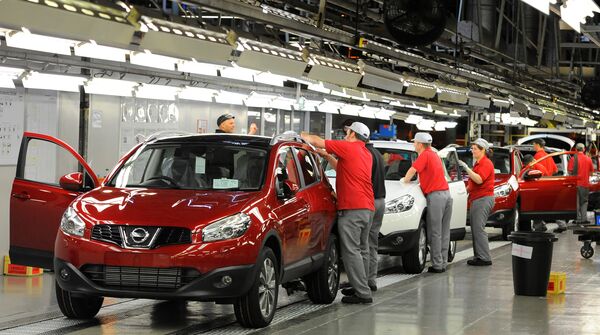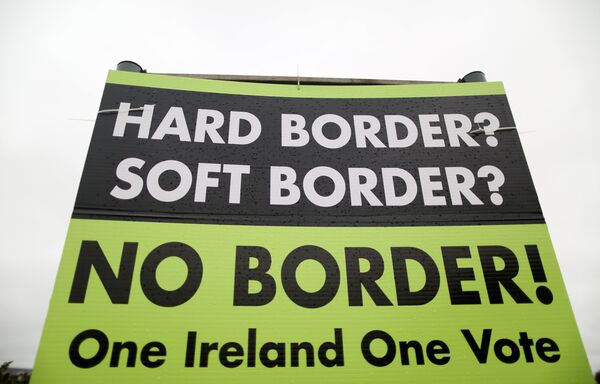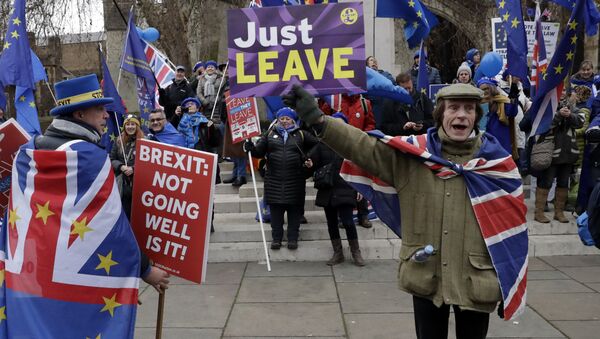Irish Finance Minister Paschal Donohoe dismissed Westminster's claims that it was possible to use existing technology in order to solve the Irish backstop issue. Dublin will not engage in any process that leads to a hard border, he added.
His comments reflected the outlined position of Ireland's Sinn Fein, whose deputy leader Michelle O'Neill said the backstop provision won't be renegotiated.
We made it clear today to Kier Starmer that the backstop needs to be protected, it is the bottom line and it cannot be renegotiated or opened up again — @moneillsf pic.twitter.com/XFgVrqQWzw
— Sinn Féin (@sinnfeinireland) February 4, 2019
O'Neill and Sinn Féin president Mary Lou McDonald are set to meet with Theresa May this week.
.@MaryLouMcDonald and I will meet Theresa May in London this week to reiterate to her that the Good Friday Agreement must be protected and that the backstop cannot be scrapped, it must be maintained — @moneillsf pic.twitter.com/7BGvZCMuV1
— Sinn Féin (@sinnfeinireland) February 4, 2019
Primary Roadblock to Brexit Deal
Apart from the scheduled meetings with the Irish political leadership, Theresa May will also meet with business leaders in Europe and Northern Ireland. On Monday, the PM will appeal to Europeans to remind them of how significant it is for businesses to see Britain leaving the EU with a deal.
READ MORE: Theresa May Determined to Deliver Brexit on March 29 — May's Spokesman
On Tuesday, during her trip to Northern Ireland Mrs. May will deliver a Brexit speech and address business leaders with an expectedly similar message.
Concerned with the Brexit blow to British economy, the PM on Monday called the decision by Japan's Nissan to not to build the X-Trail model at its existing UK plant in Sunderland — "obviously very disappointing."
Labour Party leader reacted to Nissan's announcements, blaming the Conservative party for "botched negotiations and threat of a No Deal Brexit."

While economic fallout from Brexit and the uncertainty surrounding the process concerns business leaders in all parts of the country, the political stance of officials remains rigid.
Northern Ireland's Democratic Unionist Party will most likely react to another Brexit appeal by the UK Prime Minister along the lines of its permanent position opposing any form of separation from the UK.
Last week, DUP's MEP for Northern Ireland Diane Dodds said that Brussels must partake in the renegotiation of the backstop.
"Rather than a roadmap to avoiding a hard border, the backstop is now the primary roadblock to a better and fairer deal," the MEP said.

"The EU may be burying its head in the sand but there is no path to ratifying a final Brexit deal without legally-enforceable changes to the draft withdrawal agreement. The backstop trap doesn't simply hold the threat of a bad deal but of no deal at all," Mrs. Dodds added.
The DUP, alongside other parties in the UK Parliament, will hear back from Mrs. May on 13 February, as she will either bring a revised deal to the House or make a statement on the state of the negotiations. A motion then will be put forward on 14 February, giving MPs a chance to vote on the PM's Brexit plans.
Alternative Arrangements
Meanwhile, Theresa May has attempted to heal the divide in her party by holding a meeting for the "alternative arrangements working group." In other words, the PM is meeting with pro-EU and pro-Brexit Tory MPs in early Monday afternoon to discuss the way forward on the Irish backstop.
An attempt to get the Tory warring factions to talk to each other and come up with "alternatives" is not feasible, according to the Labour chair of the Brexit committee.
"A lot of it to me, I have to say, personally, looks very familiar if you go back to last summer when people looked at technology and trusted traders and all of that, and a great deal of effort was put into examining those as a possible way forward… And I personally, but others will have a different view, personally I don't see how it can work particularly in the very short amount of time that there is left," Hilary Benn MP said.
Meanwhile, the commentary coming from EU Brexit meetings has suggested that the bloc was right to start no-deal preparations end of last year.
On the EU side, nobody is considering this. Asked whether any assurance would help to get the Withdrawal Agreement through the Commons, the answers of MPs were… inconclusive…. The meeting confirmed that the EU did well to start its no deal preparations in December 2017.
— Martin Selmayr (@MartinSelmayr) February 4, 2019


